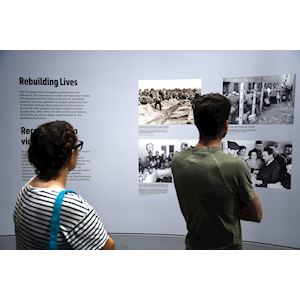
122 - Bearing Witness - Rebuilding Lives
NARRATOR Following Germany’s surrender and the liberation of the camps, survivors of the catastrophe—former prisoners, refugees, people who had been in hiding—emerged, struggled to heal, and sought any means to rebuild their lives. In some instances, survivors tried to return to their homes to discover them in ruins… or worse. Some were met with hatred, more anti-Semitism, and even violence. Walter Kase: "We stayed in Poland for six months. It was a terrible time in Poland. After all of this suffering, the Jewish people went through concentration camps and ghettos and extermination camps in Poland, there was a wave of anti-Semitism in Poland. There were pogroms in small towns…” NARRATOR In many cases, individual survivors greeted their freedom alone—perhaps as the sole survivor of their family or community—and homeless. They were identified as displaced persons. Allied authorities and the United Nations Relief and Rehabilitation Administration made massive effort to shelter and support these people by creating Displaced Persons Camps in 1945. The conditions and processes at these camps were challenging at first. More than one million displaced persons—each with unique trauma and needs, lived in the camps. Often located in areas devastated by the war, the camps offered community building, job training, and education. Mady Deutsch: "…It was four years of my life, you know, just sitting and waiting in a camp, and I tried to learn whatever I could. If they offered a course in English, I started to learn English. If they offered a course in sewing, I tried to do that, to learn anything and everything or just keep occupied because I was just a young girl..." NARRATOR In the displaced persons camp, countless reunions, weddings, births, and religious celebrations took place. By 1952, approximately a quarter million Jews had moved through the camps to new lives—often in Israel, Canada, Latin America… and 72,000 Holocaust survivors emigrated to the United States. Nearly a thousand settled in Houston. But not everyone could be resilient. We hear testimony from many courageous survivors who faced extreme deprivation and trauma, who came through the catastrophe—sometimes scarred deeply. Just as powerful is the silence of those who did not make it. Many nameless. Many leaving no family to remember them. We honor their memory too.


Holocaust Museum Houston
Holocaust Museum Houston is dedicated to educating people about the Holocaust, remembering the 6 million Jews and other innocent victims and honoring the survivors’ legacy. Using the lessons of the Holocaust and other genocides, we teach the dangers of hatred, prejudice, and apathy.
- 5401 Caroline
- Houston United States
- 713-942-8000
- www.hmh.org
